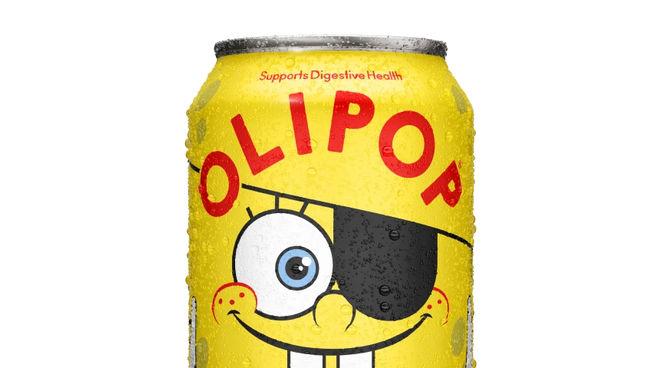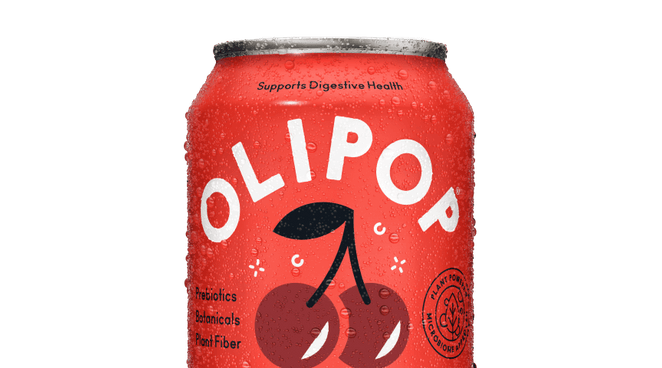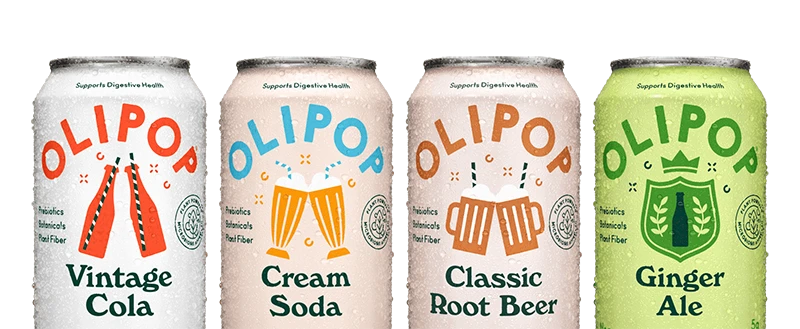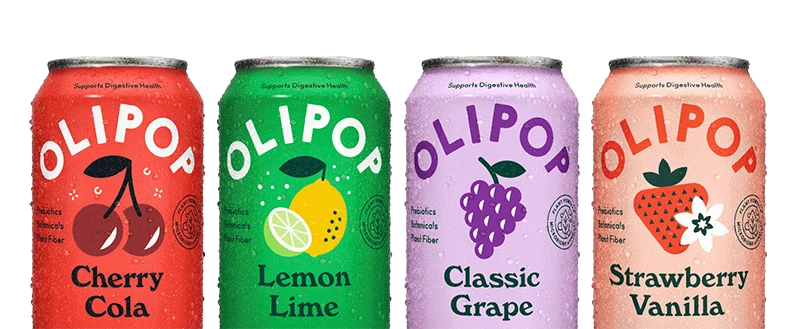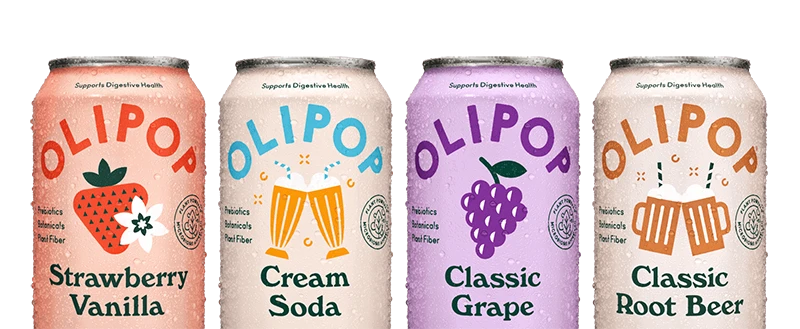As Americans are increasingly reducing their added sugar intake, the door has opened for sugar alternatives, like Stevia, to substitute for sugar. With all the sweetness and none of the calories, Stevia has quickly become a popular option used in processed goods and at home.
Learn more about what exactly Stevia is as we debunk some of the biggest myths surrounding this sugar alternative.
What Is Stevia?
Stevia is a non-nutritive or zero-calorie alternative to sugar. The sweetener comes from the leaves of the Stevia rebaudiana plant, a shrub native to South America. [1] The indigenous population there has been using the leaf of the Stevia plant for its sweetness for over 100 years. [1]
The plant’s sweet taste can be anywhere from 180-400 times sweeter than table sugar. Plus, it contains so few calories it’s considered “zero-calorie”, making it a popular sweetener used in soda, baked goods, canned fruits, dairy products, and more for those looking to cut back on sugar. [2]
What Is the Difference Between Sugar and Stevia?
While sugar gets a bad rap, it actually plays an important function in our body: providing us with the energy our cells need to survive. Sugar is a class of carbohydrates found naturally in many foods like fruit, vegetables, and other plants. [3] There are three types of simple sugars: glucose, fructose, and galactose. These simple sugars are the building blocks that make up all types of carbohydrates. [3]
The table sugar you pour into your coffee or add to your baked goods is called sucrose. It’s a compound that’s made up of two molecules—glucose and fructose—and breaks down into these simple sugars once digested. Most table sugar you buy comes from sugar beets or sugar cane. [3]
Stevia, on the other hand, is a non-nutritive sweetener because it offers zero nutritional value to the body. The Stevia leaf extract is a compound that is not metabolized like sugar. Rather, it passes through the body and is primarily excreted in the urine, meaning it provides sweetness without the calories. [4]
Stevia Myths
While this sugar alternative has some pretty sweet benefits compared to sugar, there are still myths that need busting on the role of Stevia in your diet.
Myth 1: Is Stevia an artificial sweetener?
Stevia is a plant-sourced sweetener because it comes from the Stevia rebaudiana plant. Artificial sweeteners, such as aspartame and acesulfame K, are man-made or chemically modified in a lab.
Both Stevia extract and artificial sweeteners are Generally Recognized as Safe (GRAS) by the U.S. Food and Drug Administration (FDA). However, whole-leaf Stevia is not GRAS-approved and is still under review. [5] This means any Stevia you consume is an extract from the leaf as opposed to the whole leaf itself.
Myth 2: Is Stevia bad for you?
Stevia and other non-nutritive sugar alternatives have zero calories and zero nutritional value, but that doesn’t mean they have zero benefits. Non-nutritive sweeteners can support a healthy diet by helping you limit your sugar intake because consuming too much added sugar is linked to various health concerns. [6] (Reminder: Stevia and other non-nutritive sweeteners such as aspartame, saccharin, sucralose, cyclamate, and acesulfame K are not added sugars.)
When eaten in excess, sugar can be addictive. Anyone embarking on a no added sugar diet knows how hard it can be to cut out added sugar. This is because sugar activates your brain’s reward center much like the addiction response of certain drugs. [7] Scientists at the U.S. National Institute on Drug Abuse were among the first to show that sugar can change the wiring of your brain, much like cocaine or alcohol. [7] The more sugar you eat, the more you need to satisfy your cravings. When you stop eating sugar your body goes into a state of withdrawal, similar to other addiction recovery responses.
As a result, non-nutritive sweeteners are often used to help limit the amount of added sugar in the diet while still providing sweetness. By replacing your sugar-sweetened beverage or food with a non-nutritive sugar alternative like Stevia, you can reduce your added sugar intake without completely removing sweets from your diet. The American Heart Association encourages this as a potential strategy for reducing sugar-sweetened beverages and food items. [8]
While researchers are still examining how the body processes all sugar alternatives, stevia proves to be a helpful tool for reducing or limiting your added sugar intake.
Myth 3: Does Stevia raise blood sugar?
Sugar-sweetened beverages spike your glucose and insulin levels as your body works hard to manage all this sugar running through your system. [14] Whether sugar substitutes or sweeteners impact your body in the same way is up for debate.
In one study, participants had a higher blood glucose level after drinking maltodextrin, glucose, and sucrose beverages compared to both water and Stevia. [9] Other studies have found opposite results with a larger increase in glucose levels after Stevia consumption compared to sugar. [1] One study reports a 22% higher incidence of diabetes among non-nutritive sweetener consumers. However, this study is observational and thus does not prove that non-nutritive sweeteners increase the risk of developing diabetes. [11]
Most studies show that Stevia supports a much lower glucose response than sugar. This suggests that any links between diabetes and non-nutritive sweeteners could be the result of reverse causality or confusion around cause and effect. [1]
Myth 4: Can Stevia cause weight gain?
Quite the opposite, actually! Consuming a lot of sugar, particularly sugar-sweetened beverages, is associated with an unhealthy diet, increased calorie consumption, and obesity. [9] But by replacing added sugar with a zero-calorie sweetener like Stevia, you could help reduce that calorie consumption to support your weight loss goals. [9]
In one study comparing Stevia, sugar, and water consumption, researchers found that drinking a Stevia-sweetened beverage before a meal can help reduce your appetite and total energy intake more than both a sugar-sweetened beverage and water. [9]
However, it’s key to keep in mind that Stevia by itself is not a magic pill for weight loss. It’s not Stevia that aids in weight loss, but rather the lack of added calories through sugar. It’s one piece of the puzzle to a healthier lifestyle.
It’s often the choices you make alongside your Stevia consumption that result in weight gain or weight loss. Weight loss requires a lot of work outside of just swapping your traditional soda with a Stevia-sweetened beverage. A healthy lifestyle involves everything from healthy eating, to exercise, to sleep, and more. [2]
Myth 5: Is Stevia bad for gut health?
Some artificial sweeteners, like sucralose, aspartame, and saccharin, could potentially disrupt the gut microbiota. [10] In a study done on mice, this disruption resulted in impaired glucose tolerance, which is a major risk factor for several metabolic diseases. [10] Another study on mice with eight weeks of exposure to aspartame also led to impaired glucose tolerance. [11] Neither of these studies involved Stevia.
However, research is divided on the topic of gut health and sweeteners. Another literature review and panel of experts found no conclusive evidence that low-calorie sweeteners like Stevia impact human gut microbiota, especially when you consider the low concentrations of Stevia in your food and beverages. [2] [12]
Another study from Glasgow, UK that measured the effect of thirteen different food additives, sweeteners, and hygiene products found that Stevia was one of the few that had no or minimal effect on the gut. [13]
Although we need more research in this area, the evidence so far today suggests that Stevia does not play any major positive or negative role in your digestive health.
Luckily, that’s what OLIPOP is here for instead! We've assembled a global team of leading human gut microbiome research pioneers to craft a soda focused on supporting your gut health with plant fiber, prebiotics, and botanicals.
Does OLIPOP Use Stevia?
Stevia extract is one of the sweeteners we use in OLIPOP. We’ve spent years formulating a unique sweetening blend that combines sugars from fruits (juices and juice concentrates), cassava syrup, and a high-quality, mild strain of Stevia leaf extract for maximum enjoyment.
This is how we can make a delicious drink without 40g+ of sugar or high fructose corn syrup. Instead, Stevia offers a sweet taste with none of the calories, which is how our flavors contain 2-5g of sugar. Plus we've loaded each bubbling flavor with digestive health-supporting ingredients for better gut health along with a refreshing taste.
Sources
- 1 Farhat, G., Berset, V., & Moore, L. (2019). Effects of Stevia Extract on Postprandial Glucose Response, Satiety and Energy Intake: A Three-Arm Crossover Trial. Nutrients, 11(12). https://doi.org/10.3390/nu11123036
- Everything You Need to Know About Stevia Sweeteners. (2021, May 10). Food Insight. https://foodinsight.org/everything-you-need-to-know-about-stevia-sweeteners/
- What Is Sugar? (2021, April 21). The Sugar Association. https://www.sugar.org/sugar/what-is-sugar/
- Ashwell, M. (2015). Stevia, Nature’s Zero-Calorie Sustainable Sweetener. Nutrition Today, 50(3), 129–134. https://doi.org/10.1097/nt.0000000000000094
- What’s the Difference Between Stevia Extract and Stevia Leaves? (2018, January 22). Calorie Control Council. https://caloriecontrol.org/whats-the-difference-between-stevia-extract-and-stevia-leaves/
- Stanhope, K. L. (2015). Sugar consumption, metabolic disease and obesity: The state of the controversy. Critical Reviews in Clinical Laboratory Sciences, 53(1), 52–67. https://doi.org/10.3109/10408363.2015.1084990
- How Much Is Too Much? (2018, December 8). Sugar Science UCSF. https://sugarscience.ucsf.edu/the-growing-concern-of-overconsumption.html#.YK5pgWjYq3C
- Pallazola, V. A., Davis, D. M., Whelton, S. P., Cardoso, R., Latina, J. M., Michos, E. D., Sarkar, S., Blumenthal, R. S., Arnett, D. K., Stone, N. J., & Welty, F. K. (2019). A Clinician’s Guide to Healthy Eating for Cardiovascular Disease Prevention. Mayo Clinic Proceedings: Innovations, Quality & Outcomes, 3(3), 251–267. https://doi.org/10.1016/j.mayocpiqo.2019.05.001
- Stamataki, N. S., Scott, C., Elliott, R., McKie, S., Bosscher, D., & McLaughlin, J. T. (2020). Stevia Beverage Consumption prior to Lunch Reduces Appetite and Total Energy Intake without Affecting Glycemia or Attentional Bias to Food Cues: A Double-Blind Randomized Controlled Trial in Healthy Adults. The Journal of Nutrition, 150(5), 1126–1134. https://doi.org/10.1093/jn/nxaa038
- Nettleton, J. E., Reimer, R. A., & Shearer, J. (2016). Reshaping the gut microbiota: Impact of low calorie sweeteners and the link to insulin resistance? Physiology & Behavior, 164, 488–493. https://doi.org/10.1016/j.physbeh.2016.04.029
- Sylvetsky, A. C., & Rother, K. I. (2018). Nonnutritive Sweeteners in Weight Management and Chronic Disease: A Review. Obesity, 26(4), 635–640. https://doi.org/10.1002/oby.22139
- Schleicher, A. (2020, December 9). Sweetener safety in spotlight after study links stevia to gut microbial imbalance. Nutrition Insight. https://www.nutritioninsight.com/news/sweetener-safety-in-spotlight-after-study-links-stevia-to-gut-microbial-imbalance.html
- Fleishman, C. (2020, February 12). Additives May Change Gut Microbes. International Probiotics Association. https://internationalprobiotics.org/additives-can-change-gut-microbes/
- Tey, S. L., Salleh, N. B., Henry, J., & Forde, C. G. (2016). Effects of aspartame-, monk fruit-, stevia- and sucrose-sweetened beverages on postprandial glucose, insulin and energy intake. International Journal of Obesity, 41(3), 450–457. https://doi.org/10.1038/ijo.2016.225
- American Diabetes Association. (2020). Facilitating Behavior Change and Well-being to Improve Health Outcomes: Standards of Medical Care in Diabetes—2021. Diabetes Care, 44(Supplement 1), S53–S72. https://doi.org/10.2337/dc21-s005
- Stevia is a non-nutritive or zero-calorie alternative to sugar that comes from the leaves of the Stevia rebaudiana plant, a shrub native to South America.
- Stevia leaf extract isn't metabolized like sugar. Rather, it passes through the body and is primarily excreted in the urine, meaning it provides sweetness without the calories.
- OLIPOP uses stevia instead of sugar and corn syrup in our sodas.




